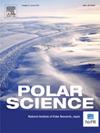Fragmented Arctic science: Permafrost as a salient feature in the divergence between geopolitical and chronopolitical perspectives
IF 2
4区 地球科学
Q3 ECOLOGY
引用次数: 0
Abstract
Russia’s war in Ukraine has drastically affected the Arctic governance, freezing institutional mechanisms established in the post-Cold War period. Among the lasting consequences, scientific cooperation between Western and Russian research communities has been impaired involving international projects on critical environmental issues in the polar region. Although joint research activities have been curtailed since February 2022, efforts have been made to revive Arctic scientific dialogue to address the pressing concerns related to rapid climate change in the polar region. Monitoring permafrost conditions is a key feature in anticipating the future trajectory of the planet. However, about 65% of Russia’s territory is covered by permafrost, which represents a serious blind spot for the Western scientific community without data access. Given the current geopolitical breakdown, this situation could jeopardize climate modeling and ultimately pose a threat to international security. At the same time, Russia is pursuing and developing Arctic scientific cooperation with non-Western partners, including China and India. These countries are now becoming competitors with the Western research community, thereby creating alternative channels for the flow of scientific knowledge. Using the example of permafrost research, this article examines the long-term implications of the decoupling of Russia and the West in the domain of polar science.
支离破碎的北极科学:永久冻土是地缘政治和时间政治观点分歧的一个显著特征
俄罗斯在乌克兰的战争极大地影响了北极的治理,冻结了冷战后时期建立的体制机制。在持久的后果中,西方和俄罗斯研究界之间的科学合作在涉及极地地区关键环境问题的国际项目方面受到损害。尽管自2022年2月以来,联合研究活动受到了限制,但各方仍在努力恢复北极科学对话,以解决与极地地区快速气候变化有关的紧迫问题。监测永久冻土条件是预测地球未来轨迹的一个关键特征。然而,大约65%的俄罗斯领土被永久冻土覆盖,这对西方科学界来说是一个严重的盲区,无法获得数据。鉴于当前地缘政治的崩溃,这种情况可能危及气候模型,并最终对国际安全构成威胁。与此同时,俄罗斯正在寻求和发展与包括中国和印度在内的非西方伙伴的北极科学合作。这些国家现在正成为西方研究界的竞争对手,从而为科学知识的流动创造了另一种渠道。本文以永久冻土研究为例,探讨了俄罗斯与西方在极地科学领域脱钩的长期影响。
本文章由计算机程序翻译,如有差异,请以英文原文为准。
求助全文
约1分钟内获得全文
求助全文
来源期刊

Polar Science
ECOLOGY-GEOSCIENCES, MULTIDISCIPLINARY
CiteScore
3.90
自引率
5.60%
发文量
46
期刊介绍:
Polar Science is an international, peer-reviewed quarterly journal. It is dedicated to publishing original research articles for sciences relating to the polar regions of the Earth and other planets. Polar Science aims to cover 15 disciplines which are listed below; they cover most aspects of physical sciences, geosciences and life sciences, together with engineering and social sciences. Articles should attract the interest of broad polar science communities, and not be limited to the interests of those who work under specific research subjects. Polar Science also has an Open Archive whereby published articles are made freely available from ScienceDirect after an embargo period of 24 months from the date of publication.
- Space and upper atmosphere physics
- Atmospheric science/climatology
- Glaciology
- Oceanography/sea ice studies
- Geology/petrology
- Solid earth geophysics/seismology
- Marine Earth science
- Geomorphology/Cenozoic-Quaternary geology
- Meteoritics
- Terrestrial biology
- Marine biology
- Animal ecology
- Environment
- Polar Engineering
- Humanities and social sciences.
 求助内容:
求助内容: 应助结果提醒方式:
应助结果提醒方式:


